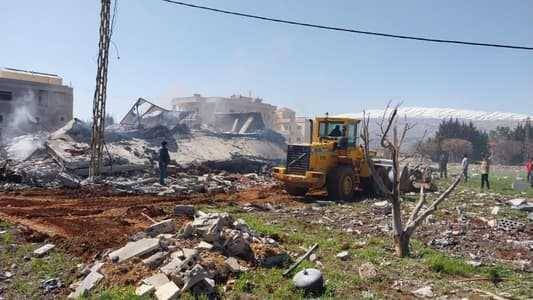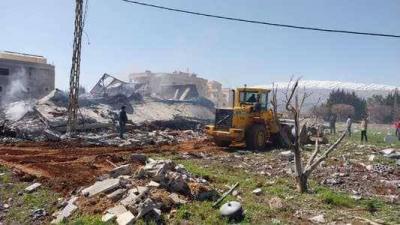For the first time in over five months, the limited war between Israel and Hezbollah is beginning to exceed its boundaries due to the Israeli army's insistence on expanding its target bank to include objectives that have not been struck since the outset of the conflict. Israel's deviation from the rules of engagement and containment was met with Hezbollah's atypical response, targeting military centers in the occupied Golan Heights, a development with significant implications aimed at pressuring Israel to revert to the previously established engagement rules, according to the Kuwaiti newspaper "Al-Rai."
Instead of targeting points deep within Israeli territory, Hezbollah has hit military sites along the Lebanese border up to the Golan Heights, providing Israel a chance to return to the established engagement framework. So where are things heading between the two sides? And has the likelihood of a major war increased more than before?
In its bombardment of targets in Southern Lebanon and the Beqaa region, Tel Aviv is daily dropping around 4 to 5 tons of explosives, while Hezbollah is careful to respond with an equal amount against Israeli targets, often striking military objectives along the approximately 110-kilometer Lebanese southern border. This long front is a significant area where Hezbollah is asserting its readiness and presence of forces on permanent alert to exchange targeted strikes using laser-guided missiles (when Israel employs drones) or solid-fuel rockets with 250-500 kilograms of explosives, as well as Katyusha rockets carrying 50 kilograms of explosives, which it launched en masse, firing 100 rockets at Israeli army positions in the Golan.
When Israel targets the Lebanese interior or kills civilians—albeit unintentionally—Hezbollah retaliates with heavy rockets or missile salvos that incorporate major enemy airbases and the Golan into the battle equation to establish a balance, hoping that Israel will adhere to the rules of engagement and return to the confines of a limited war.
Furthermore, information about Israel's preparedness for war and its training for an upcoming battle with Hezbollah has been met with a general state of readiness and mobilization from the party across various fronts, especially in the western Beqaa and the Syrian border. The possibility that Tel Aviv might penetrate through the vulnerable Syrian flank to reach the western Beqaa remains a constant consideration for Hezbollah's military leadership.
Consequently, attacks on the Golan Heights carry significant messages indicating that the Syrian front will not be spared from war if Israel desires to expand its operations, and Hezbollah is equally prepared on that front as it is in Southern Lebanon, according to "Al-Rai." Leadership sources state that the Gaza battle has become secondary and operational, shifting focus back to the original front in Lebanon. For over five months, Hezbollah has been troubling the Israeli army and leadership, compelling them to prepare three permanent divisions supported by seasoned special units that fought in Gaza and are now positioned on the Lebanese border.
Had Hezbollah not entered the fight, Israel would have deployed its full strength in Gaza and ended the conflict much sooner. This dispersion of forces left a bitter impact on Israeli leaders, who can no longer tolerate the imposed war and want a permanent solution to the threat on the northern Lebanese front to return over 100,000 displaced Israelis. This could lead to a downward spiral towards a more intense missile exchange, especially with rising calls within Israel for the initiation of a major conflict with Lebanon.
Sources affirm that coexisting with the idea of a comprehensive war and preparing for it by learning from the ongoing conflicts in Gaza and Lebanon has become a reality. Field commanders do not deny Israel's tremendous destructive capacity, having destroyed thousands of homes and caused significant damage to tens of thousands more in Southern Lebanon. However, Hezbollah possesses a destructive capability that Israel will undoubtedly witness in areas that have previously known no destruction, should Israel exceed the current stage of engagement and strike the Lebanese interior.
Sources believe that even in a total war scenario, there should be controlled engagement that spares residential areas, maintaining the battle within the scope of targeting military centers and armed forces involved in the conflict. However, if matters devolve, targeting a port would be met with a corresponding attack on another port, an airport against another airport, and a residential building for a residential building.
What has thus far prevented war are the weapons Hezbollah possesses, which the army sees but cannot fully ascertain, unlike hardline Defense Minister Itamar Ben Gvir, who is urging Defense Minister Yoav Galant to commence a comprehensive war on Lebanon. Field commanders in the resistance axis state that a full-scale war would be undoubtedly devastating for Lebanon but would be a hundredfold more destructive for Israel than what it faced in 2006. The multiple fronts (Iraq, Yemen, Syria) would not hesitate to participate, even if the U.S. intervened, with its officers and soldiers involved in Gaza warfare.
Regarding the objectives and reconstruction, sources indicate that the July 2006 war cost less than three billion dollars for reconstruction. Consequently, significantly larger amounts would be allocated for the reconstruction of infrastructure, homes, roads, and damaged bridges if necessary. However, Israel's goals, if it were to go into a comprehensive war, would not be clear; regardless of its actions, invading Lebanon would be catastrophic for it, and it would not be able to sustain itself for even one day. Thus, displacing Hezbollah and the southern population from the borders is impossible. This indicates that Tel Aviv will not have achievable goals other than destruction.
However, Hezbollah is not Hamas, and Lebanon’s border remains open for logistical support if necessary, despite self-sufficiency and the capability for high-tech local production. Therefore, reciprocal destruction would likely lead to the downfall of Prime Minister Benjamin Netanyahu, who is wobbling in his position under increasing internal and external pressure. Hence, his decision to escalate into war with Lebanon would be akin to the final nail in his political coffin. This is dictated by political and military logic, but does Israel act rationally and sensibly since the Gaza war? Will it consider the Lebanon conflict as existential? The answers remain to be seen in the coming weeks.




